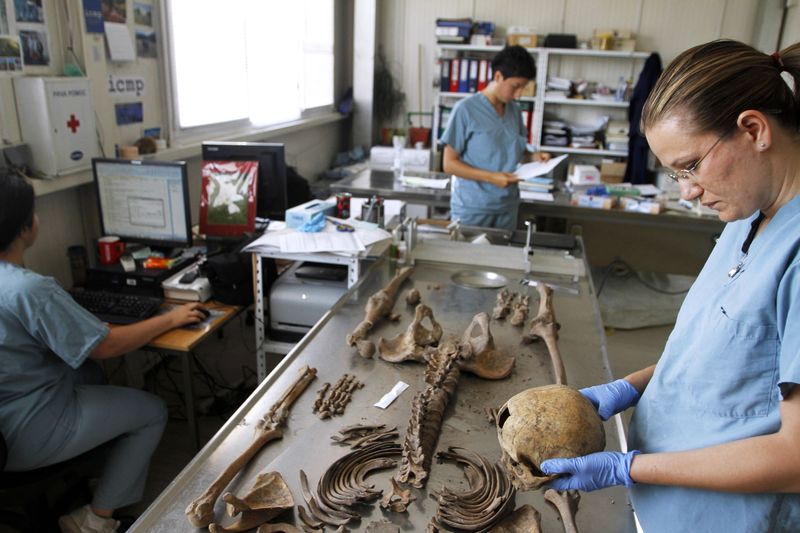By Daria Sito-Sucic
TUZLA, Bosnia (Reuters) - Bosnia was still digging up the bones of its own when those of others began arriving in boxes from the tsunami-struck shores of Southeast Asia a decade ago.
It coincided with Kathryne Bomberger's rise to head of the Bosnian-based International Commission on Missing Persons (ICMP), created in 1996 on the initiative of Bill Clinton to unearth the secrets of gruesome death pits strewn across the Bosnian countryside following its 1992-95 war.
The ICMP sent a handful of staff to Thailand to set up a laboratory to collect blood samples from relatives of some of the 230,000 people who perished when a giant wave struck in December 2004, matching them with DNA from bone samples of the victims sent to Bosnia. It helped identify some 800.
"That was really a huge learning experience for us," Bomberger told Reuters in an interview.
A decade later, what started as an ad hoc body devoted to the former Yugoslavia has become the world's leading authority on missing people, a status enshrined last month in a treaty signed by five European governments – Britain, Belgium, the Netherlands, Luxembourg and Sweden – that will see the organization move its headquarters this year from Sarajevo to The Hague and become a permanent global body.
The move is recognition of the ICMP's success not just in the ex-Yugoslavia, but in Thailand, the Philippines, Chile, South Africa, the United States, Iraq, Libya, Colombia and others, where its unique DNA-identification techniques have helped identify victims of natural disasters such as Hurricane Katrina, of political repression, drug crime, apartheid and war.
Mexico is next, Bomberger says, while Syria - with tens of thousands missing - represents a looming challenge. The ICMP says it has proposed working with Syrian refugees to collect data on missing relatives, and has met with opposition figures.
"Rarely in life can you change the world, and I think this treaty is something that does change the world," Bomberger said, adding that other states were expected to sign up.
"CAN'T DO IT ALONE"
An American, Bomberger joined the ICMP two years after its creation, since when it has helped identify 70 percent of 40,000 missing people from the Yugoslav wars of the 1990s, including many of the more than 8,000 Bosnian Muslim men and boys killed when the U.N. 'safe haven' of Srebrenica fell to Bosnian Serb forces in 1995.
Mass graves are still being unearthed in Bosnia, but the ICMP has effectively outgrown the former Yugoslav republic, a success-story hard to match in a country otherwise still coming to terms with the war's legacy, deeply divided and dysfunctional. Most of ICMP's 140 staff are Bosnians.
The ICMP owes its success to the DNA identification process it developed to tackle Srebrenica, where most victims were found in secondary graves, dug up from the pits they were first tossed into and moved to others in an attempt to conceal the crime, scattering remains, belongings and evidence.
"It was absolutely impossible to identify these mortal remains through any other means," said Bomberger. DNA analysis has yielded the names of 98 percent of 6,900 Srebrenica victims identified so far.
Crucially, the organization lobbied for and helped craft a legal framework and institutions in Bosnia to deal with an issue that frequently becomes politicized in the aftermath of war or the fall of a regime, left to the efforts of civil society and human rights groups to press a state into action.
"We look at DNA technology, but that technology does not work until a state makes a decision to search for persons missing regardless of their ethnic, religious or national origin, in a non-discriminatory fashion," Bomberger said.
Nura Beganovic is still searching for her only brother believed killed in Srebrenica.
"It means a lot to us when there is such an international organization capable of helping us. We can't do it alone," she said adding that she was worried the ICMP's move might affect efforts to find the last of Bosnia's dead.
Evidence collected at the ICMP's identification center in the city of Tuzla, housed in a sport center, has been used in hundreds of criminal cases since the war.
Staff in masks work in sterile, white rooms, divided by glass walls. Blood and bone samples are stored in huge refrigerators, and data collected from every case the ICMP has ever handled is stored in a vast and growing online database.
Hajra Catic is a frequent visitor, searching for the remains of her son.
"I can't sleep at night, hoping I'll be able to identify him," said Catic, who lost her husband and 20 other relatives in Srebrenica, the worst massacre on European soil since the World War Two. "I wish just to have a little finger of his, so I can bury him."
